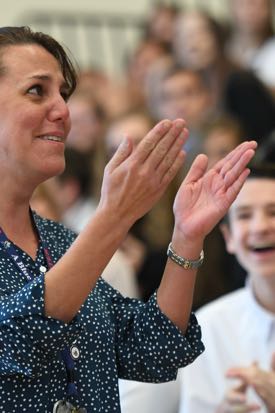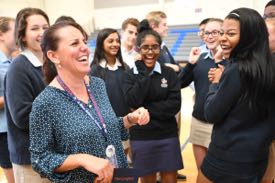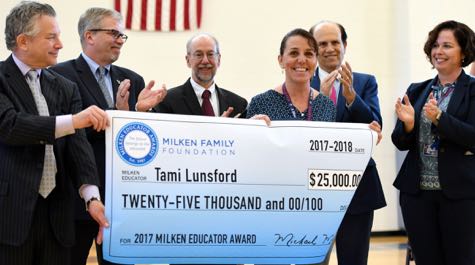VIMS alumna receives national recognition for science teaching
Lunsford is DE's first recipient of Milken Educator Award
Tami Lunsford, who earned her Master’s degree at William & Mary’s Virginia Institute of Marine Science in 2002, has been named Delaware’s first winner of a Milken Educator Award for her success in teaching high school science at Newark Charter High School.
The awards, hailed by Teacher magazine as the "Oscars of Teaching," come with an unrestricted $25,000 prize. The Milken Family Foundation says their initiative “not only aims to reward great teachers, but to celebrate and elevate these classroom innovators as they guide America's next generation of leaders.”

Mike Milken, Foundation president and co-founder, surprised Lunsford with the Award in front of a visibly excited student body. He and Delaware's Associate Secretary of Education Angeline Rivello cited the consistent success of Lunsford‘s students and her many contributions to the school.
An early interest in teaching
Professor Iris Anderson, Lunsford’s M.S. advisor at VIMS, says “Tami was a star student who took an early interest in teaching. Anyone who knows her easily understands how her marine science knowledge and enthusiasm would make her an outstanding educator.”
Lunsford describes receiving the Award as “overwhelming and amazing,” and credits her graduate experience as key to her decision to pursue a career in the classroom.
“I wouldn’t be half the teacher I am without my time at VIMS,” says Lunsford. “I had no intention of being a high school teacher when I was in grad school, but two things happened. First, I realized how much I love marine science but that I get seasick! Second, [former Sea Grant educator] Susan Haynes convinced me to spend one day a month going into local middle schools with a bucket of epifauna to teach students about marine biology. I quickly found that to be the highlight of my month and realized I was meant to be in education.”
Lunsford says her experience at VIMS lets her “talk to my students about how science really works and how scientists get funding, do research, and share their research. I can show them my Master's thesis and they believe that I actually know what I’m talking about!”
{{youtube:medium|8VPnleE3pes, Watch as Lunsford discovers she's won the Milken Educator Award. © Milken Family Foundation}}Lunsford began at Newark Charter in 2013, helping to expand the middle school into a National Blue Ribbon high school. She helped shape the school's science curriculum and was appointed its Faculty Team Leader to interact with administrators, coach new teachers, and plan interdisciplinary efforts. For her Advanced Placement (AP) courses in biology and marine science, Lunsford uses inquiry-based investigations, project-based learning, and science competitions as key instructional practices. She also builds skills to help students become proficient in collaboration, problem solving, and social responsibility.
Lunsford takes every opportunity to ensure that learning is an adventure. During one project, her students learned about sustainability and marine pollution as they transformed plastic bags into more than 5,000 sleeping mats for local homeless shelters. Her students also travel annually to Cape Henlopen for horseshoe-crab mating season and to the Bermuda Institute of Ocean Sciences every other year. They earn among the highest AP Biology scores in the state, with a 92% pass rate last year.
Lunsford is also committed to extending her students' education beyond the classroom. She helped the student-led Marine Science, Environmental, and Feminist clubs organize a visit from U.S. Senator Tom Carper to voice their concerns about national environmental policy; the students were then invited to Washington, D.C., for a legislative hearing on protecting the oceans. She also coached the Marine Science Club to an eighth-place finish in the National Ocean Sciences Bowl and helped students organize a local Science March on Earth Day, an effort that landed students an interview on National Public Radio.
“Tami’s students leave her classes with increased confidence and a true love of science,” says Milken. “Many who started with her as freshmen have headed to college as science majors, including one student who took every class Lunsford teaches and earned a full college scholarship to study marine science.”
Lunsford is also a leader in the larger science-education community. She is a past president of both the National Marine Educators Association and its regional chapter, the Mid-Atlantic Marine Education Association, in which many VIMS educators are active. In 2015, MAMEA honored Lunsford with its Classroom Teacher of the Year award. She also coordinates internships for Marine Advanced Technology, partnering with organizations like the New England Aquarium to help teachers integrate marine science units into curricula.
The Milken Awards
Lunsford is among up to 45 honorees nationwide to receive a Milken Educator Award during 2017-18.
Unlike most teacher-recognition programs, educators cannot apply for the award and do not even know they are under consideration. Candidates are sourced through a confidential selection process and then reviewed by blue-ribbon panels, with final approval by the Milken Family Foundation.
Milken Educators are selected in early to mid-career for what they have achieved and for the promise of what they will accomplish. In addition to the cash prize and public recognition, Lunsford's honor includes membership in the National Milken Educator Network, a group of more than 2,700 top teachers, principals, and specialists dedicated to strengthening education.
This year’s recipients will attend a Milken Educator Forum in Washington, D.C., in March 2018, where they will have the opportunity to network with their new colleagues and hear from state and federal officials about maximizing their leadership roles to advance educator effectiveness.
All told, the Milken Family Foundation has devoted more than $138 million in funding to the Awards initiative, which includes professional learning opportunities throughout recipients' careers. Many have gone on to earn advanced degrees and be placed in prominent posts and on state and national education committees.
The Awards alternate yearly between elementary and secondary educators. Past recipients have used their Awards to fund their children's education or their own continuing education. Others have financed dream field trips, established scholarships, and even funded the adoption of children.


